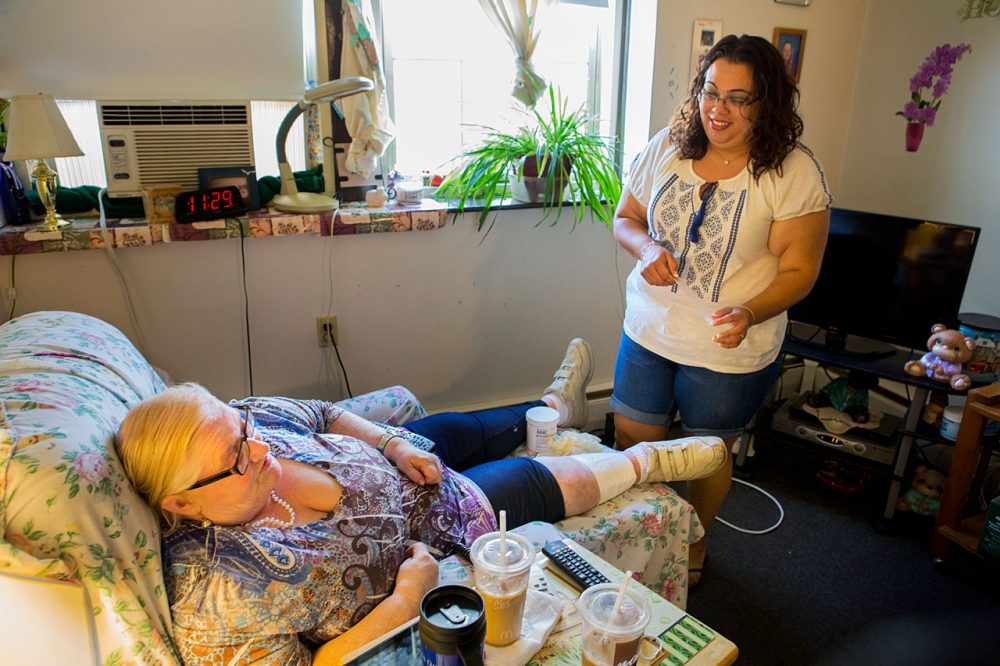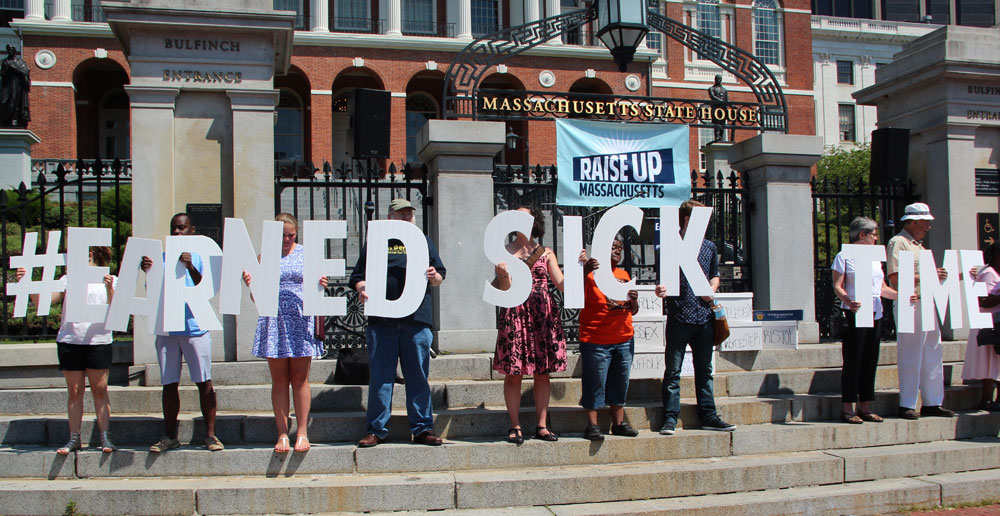Advertisement
Sick Time For All?: A Look At Mass. Ballot Question 4

Donna Dann, who's 56, has many health-related needs, and Rosario Cabrera, her personal care attendant (PCA), sees to many of them. Cabrera helps Dann wash up and take her medications. She takes Dann's vital signs and helps her monitor the genetic disorder she has, phenylketonuria.
Cabrera, 30, of New Bedford, has mostly been a nursing assistant or a PCA since graduating high school. She remembers being intimidated by working alone in a patient's home. Now, she says she loves the one-on-one interaction, and the quality care she feels she's giving.
“I just feel like Superwoman when I’m here,” Cabrera said laughing, during a recent interview from Dann's apartment in Fairhaven, where she's worked for four years. “Because it’s just me and her ... and she depends on me to give her care."
Cabrera's husband is a factory worker, and the couple has two children: a 13-year-old girl and an 11-year-old boy. Cabrera works 32 hours a week for Dann; the total care hours are set by the state Medicaid program. An active union member, Cabrera makes $13.38 an hour.
She speaks proudly of her job, but wishes she had benefits. High on that list is sick time.
“I come in to work regardless of what my health is," Cabrera said. "There’s times I’ve been very sick with a cold and I’ll just put something over my nose and mouth so I don’t get [Dann] sick, because getting her sick is worse.”
The two have a close relationship (Cabrera's kids call Dann "Nana") and Cabrera admitted that even if she had paid sick time, she'd make every effort to keep her shifts with Dann.
But she'd like the benefit as an option. "What if I really get sick? What if I really can't come in?" she said. "If I'm trying to provide quality care for somebody, how am I gonna take care of myself to be able to take care of her? Not only her, I have a family that I have to take care of.
"I consider myself a hard-working person. ... But, you know, I am entitled to be sick that one day that I really, really, really, really can't come in, and not worry that I have to suffer."
What Question 4 Would Do
A proposal to allow Cabrera — and every other worker in Massachusetts, including part- and full-timers and public and private employees — the chance to accrue and use up to five days of sick time in a year is on the November ballot. It's Question 4, and it would mandate paid or unpaid sick time, depending on an employer's size.
If the measure passes, employers would have to provide a minimum of one hour of sick time per 30 hours worked. Employees of companies with 10 or fewer workers could accrue up to 40 hours of unpaid sick time per calendar year, while employees of larger companies could accrue up to 40 hours of paid sick time. Workers could use sick time for themselves or to help an immediate family member — to tend to a medical condition, or get to a doctor's appointment, or address the effects of domestic violence. After 90 days on a job, employees could begin to use their sick time, and they could carry over banked sick time to the next year.
'One-Size-Fits-All' Criticism
Opponents of the ballot question bemoan its lack of flexibility. They say it's a costly one-size-fits-all mandate that would primarily harm small businesses, especially companies that rely on set staffing levels, like restaurants and day care operators.
"If someone calls in sick, you have to replace that person and bring in someone else for that very same shift, which means that you have double the payroll [assuming the company has 11 or more workers]," said Jon Hurst, president of the Retailers Association of Massachusetts, which has nearly 4,000 members — the great majority of which are small businesses.
Hurst worries about compliance for companies that don't have HR departments and attorneys on staff, and he believes the sick time measure would exacerbate what he calls an already-tight situation for business owners in the state.
"[The proposal is] on the heels of a 38 percent minimum wage increase, the highest health insurance premiums in the country, highest energy costs, highest unemployment insurance, all these things," he said. "The feedback that we're getting is, 'Where is it going to end?' "
Another opponent, Bob Luz, president of the 1,800-member Massachusetts Restaurant Association, makes clear he's not necessarily against sick days, but criticizes the specifics of the ballot question. He cites its inclusion of part-time workers and that employees could take sick time in hours-long increments, rather than full days. He says the existing system, in which workers get their shifts covered themselves, doesn't need a mandated overhaul.
For some, the measure is a touchy issue.
A Cambridge restaurant owner, who asked not to be named when commenting on a "sensitive topic," for fear of public backlash, says the proposal is concerning. He has 30 mostly part-time employees between his two cafes, and is worried about potential staff layoffs.
Others are leery of a potential effect on hiring: that employers might be more reluctant to offer jobs to certain workers, like single mothers, who could use up more of their sick time.

'Universal Care'
Proponents see the measure differently. They say it would put money in workers' pockets to spend in the community, and increase employee productivity and decrease turnover.
Steve Crawford, the communications director of Raise Up Massachusetts, the coalition behind the ballot effort, says nearly 1 million workers would stand to gain from its passage — about 500,000 who currently get unpaid sick time, and more than 400,000 who get no sick time at all. Crawford points to sick time policies elsewhere — in Connecticut, and cities like San Francisco and New York — and says he believes the Massachusetts proposal would be the most comprehensive law on the books. And he says that's important for the state.
"I think it is important we have the most comprehensive policy so we can honestly say that we have universal health care coverage," he said. "Because it’s not really universal if 1 out of every 3 workers can’t get the day off to go see the doctor. You may have the insurance card, but if you can’t get the day off without losing a day’s pay, or in some cases losing your job, that’s not universal care.”
Dan Wolf, a Democratic state senator from Harwich and the founder of the regional airline Cape Air, considers sick time a pro-business measure. Cape Air, which started with a handful of employees and now has more than 1,200, has always offered the benefit. He says it builds trust and loyalty, and his workers don't take all the sick time they're offered.
Wolf filed the latest iteration of earned sick time legislation this past session. His plan, which died in the Senate, would have offered up to 56 hours of sick time for workers of larger firms. He called 40 hours a "modest" benefit, when compared with many other Western nations.
The measure's proponents say research and other localities' experiences are on their side.
In 2012, the Institute for Women's Policy Research analyzed a previous Massachusetts earned sick time proposal, and calculated that its costs would be less than its benefits, yielding annual net savings of $26 million for employers. And backing Wolf's claim, the same study found that workers with accrued sick time didn't use all the days allowed to them.
In 2013, the Center for Economic and Policy Research surveyed 251 Connecticut employers about that state's sick time law, which was enacted in 2011. "Most employers reported a modest impact or no impact of the law on their costs or business operations," the report states, "and they typically found that the administrative burden was minimal."
Another issue is "presenteeism" — the decreased productivity of a sick-but-working employee. One study finds presenteeism costs the country $160 billion each year.
An 'Uphill Battle' For 'No'
Earned sick time is part of a two-pronged push by Raise Up Massachusetts, along with hiking the state minimum wage. While lawmakers hammered out a compromise on raising the pay floor, sick time died in the Legislature. Said Sen. Wolf: "I think people were reluctant to pass [both] because they thought it would be too balanced away from the pro-business groups."
So Raise Up turned to a ballot campaign, and it's been the more visible side so far. In recent days it's picked up support from the Alliance for Business Leadership and four big health care providers, including Partners HealthCare, the largest private employer in the state.
The issue has emerged as a point of distinction between the two leading candidates in the governor's race. Democrat Martha Coakley backs Question 4, while Republican Charlie Baker is opposed. Instead, in what he calls a "balanced approach," Baker on Monday proposed sick time legislation that would only apply to businesses with more than 50 employees.
And while the gubernatorial race is tight, polling suggests the "Yes" side has a clear advantage, with about a month until Election Day. A recent WBUR survey, conducted by The MassINC Polling Group, found 56 percent of respondents said they would back the proposal, compared to just 25 percent opposed. Another 18 percent said they're undecided.
The support is broad-based, according to the WBUR poll. Majorities of Democratic and unenrolled respondents back the measure, as do a plurality of Republicans. Sixty-three percent of female voters favor giving employees sick time, as do 50 percent of men.
Another survey, out Monday from Suffolk University and The Boston Herald, also has the "Yes" vote ahead, though the margin is smaller — 12 points.
For Wolf, the state senator and Cape Air founder, the various poll numbers make sense. And he says he has trouble envisioning what the opposition's information effort will look like.
"We've found that [sick time] builds loyalty, it helps keep good employees, and it helps from spreading sickness around the workplace," he said. "So it's hard for me to imagine an advertisement campaign that would be against any of those good benefits."
Opponents say they're looking out for small businesses and taxpayers, with no clear group in the crosshairs — and that makes their selling job difficult.
Luz, the head of the restaurant association, concedes it's an "uphill battle."
"When you ask someone, 'Should every employee have time off for being sick?' the natural [answer] is to say yes," he said. "Except when you sort of peel back the onion a little bit and you look at it and you say, 'OK, so, wait a minute, it costs twice as much in the service industry cause they've got to replace that shift.' That's a little bit more challenging."
